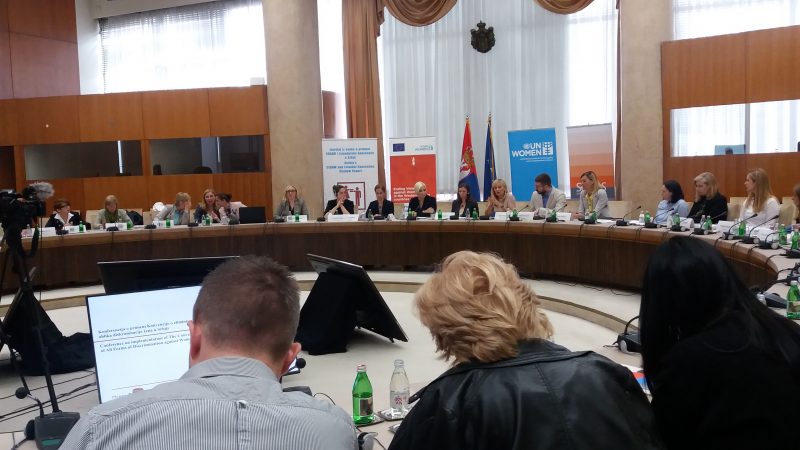The provisions of international conventions on women’s rights are not adequately implemented

24th of May, 2019: At a conference about the implementation of the Convention on the Elimination of All Forms of Discrimination Against Women, it was said that compared to the previous report, Serbia had made some progress in improving the position of women, but there were numerous complaints about the inadequate application of existing laws and their incomplete compliance with the Convention. The conference was organized by the SOS Vojvodina Network with the support of the United Nations Agency for Gender Equality and Empowerment of Women.
The conference was opened by the director of SOS Vojvodina Network Biljana Stepanov, who coordinated the preparation of the Shadow Report, prepared by a team of partner organizations of civil society and independent experts. Deputy Head of the Delegation of the European Union to Serbia Mateja Norčić Štamcar, Director of the United Nations Agency for Gender Equality and Women Empowerment in Serbia Milan Rikanović, Australian Ambassador Ruth Stewart, Director of the Office for Human and Minority Rights of the Republic of Serbia Suzana Paunović and Vice President of the Government of Serbia and Director of the Gender Equality Coordination Body, Zorana Mihajlović.
Representatives of civil society organizations, government institutions and independent experts presented from the perspective of their areas the main problems in the implementation of the Convention on the Elimination of All Forms of Discrimination against Women.
The state was called upon to adopt as soon as possible the Law on Gender Equality with a quota of 50% and to include it in addition to the representative extension and to the executive bodies, as well as to introduce functional mechanisms of protection.
It is nessesary to improve access to justice and free legal aid, to improve the protection of women from all forms of violence, not just family and partnership, to establish an alimony fund, to eradicate forced and juvenile marriages, and to start gender-responsive budgeting. It was pointed out that the noticeable strengthening of antigender discourse and the promotion of women solely as mothers, insufficient information and inadequate protection of women in the village, Roma women, disabled women, elderly women, migrant women and members of the LBT population and their lack of public life.
It was pointed out the necessity of adopting a new draft of the Law on the Prohibition of Discrimination. Harmonization of the Law on Gender Equality with the provisions of the Convention was discussed, but it was stressed that the Gender Equality Coordination Body lacks an adequate budget, sufficient staff, and especially political independence. It was said that local mechanisms for gender equality have not been established in all municipalities, that there is no adequate cooperation between state institutions at the local, regional or national level with civil society organizations.
As a conclusion of the conference, indicators for monitoring the implementation of the concluding recommendations of the Committee for the Elimination of Discrimination against Women were defined.
На конференцији о примени Конвенције о елиминсању свих облика дискриминације жена, речено је да је Србија у односу на претходни извештај остварила одређени напредак у унапређењу положаја жена, али су и изнете бројне замерке због неадекватне примене постојећих закона и њихове непотпуне усклађености са Конвенцијом. Конференцију је организовала Мрежа СОС Војводина уз подршку Агенције Уједињених нација за родну равноправност и оснаживање жена.
Конференцију је отворила директорка Мреже СОС Војводина Биљана Степанов, која је координирала израдом Извештаја из сенке, који је припремио тим партнерских организација цивилног друштва и независних експерткиња. Присутнима су се обратили и заменица шефа Делегације Европске уније у Србији Матеја Норчић Штамцар, директорка Агенције Уједињених нација за родну равноправност и оснаживање жена у Србији Милана Рикановић, амбасадорка Аустралије Рут Стјуарт, директорка Канцеларије за људска и мањинска права Републике Србије Сузана Пауновић и потпредседница Владе Србије и директорка Координационог тела за родну равноправност Зорана Михајловић.
Представнице и представници организација цивилног друштва, владиних институција и независне експерткиње су представиле из угла својих области главне проблеме у примени Конвенције о елиминсању свих облика дискриминације жена. Држава је позвана да што пре усвоји Закон о родној равноправности са квотом од 50% и да га осим представничког прошири и и на извршна тела као и да уведе функционалне механизме заштите. Било је речи о неопходности унапређења приступа правди и бесплатној правној помоћи, унапређењу заштите жена од свих облика насиља, а не само породичног и партнерског, оснивању алиментационог фонда, искорењивању присилних и малолетниких бракова, родно – одговорном буџетирању. Истакнуто је да је приметно јачање антиродног дискурса и промоције жена искључиво као мајки, недовољног информисања и неадекватне заштите жена на селу, Ромкиња, жена са инвалидитетом, старијих жена, мигранткиња и припадница ЛБТ популације и њиховој незаступљености у јавном животу. Говорило се о неопходности усвајања новог нацрта Закона о забрани дискриминације, усклађивању Закона о родној равноправности са одредбама Конвенције, али и истакнуто да Координационом телу за родну равноправност недостаје адекватан буџет, довољно особља, а посебно политичка независност. Речено је да локални механизми за родну равноправност нису успостављени у свим општинама, да не постоји адекватна сарадња државних институција на локалном, регионалном ни националном нивоу са организацијама цивилног друштва.
Као закључак конференције дефинисани су индикатори за праћење примене закључних препорука Комитета за елиминисање дискриминације жена.
